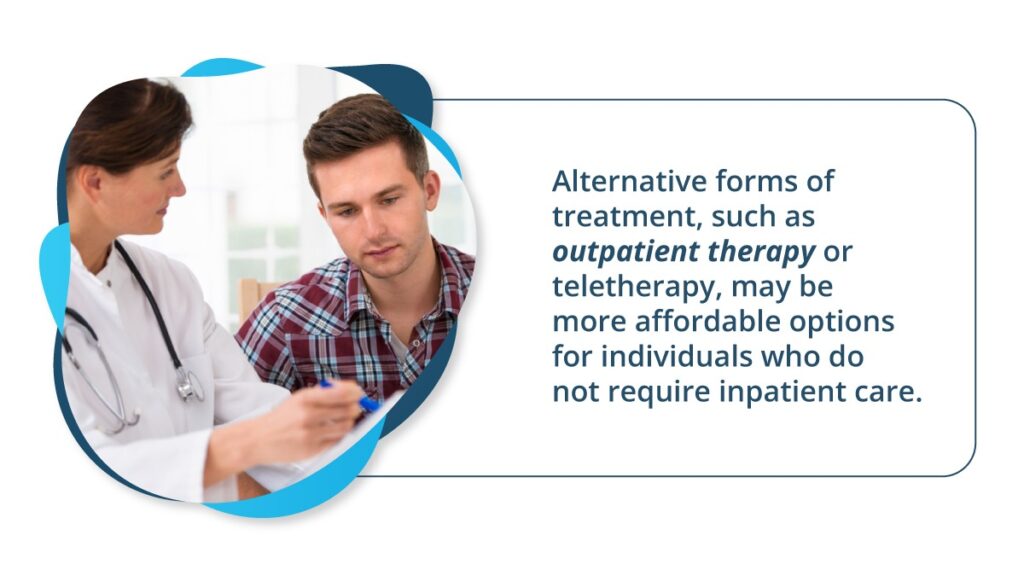
Inpatient mental health treatment refers to the medical care and treatment provided to individuals who require hospitalization or residential care due to severe mental health conditions. While these treatments can be life-changing and essential to recovery, they can also be expensive. The average cost of inpatient mental health treatment varies depending on factors like facility location and length of stay.
Understanding the factors contributing to the cost of inpatient mental health treatment can help individuals make informed decisions about their healthcare options and plan for the associated costs.
Key Takeaways
The cost of inpatient mental health treatment is a critical concern for individuals seeking help for mental health issues. Here’s what you’ll learn about the average cost of inpatient mental health treatment:
- Several factors can influence the cost of inpatient mental health treatment, including the severity of the condition, the type and location of the facility, and the length of stay.
- Patients and families should review their insurance policies to understand what is covered and what isn’t.
- Alternative forms of treatment, such as outpatient therapy or teletherapy, may be more affordable options for individuals who do not require inpatient care.
- Individuals should seek treatment for mental health conditions, regardless of cost, as untreated mental illness can have serious and long-lasting consequences on a person’s well-being and quality of life.
If you or your family member is looking for inpatient mental health care, reach out to The Haven Detox-South Florida. Contact us at (561) 328-8627 to learn about our treatment programs and service charges.
Factors Influencing Cost of Treatment
Mental health disorders can affect a person’s mood, behavior, and thinking patterns. They can range from mild to severe and impact people of all ages and backgrounds. Some common mental health disorders include mood disorders, anxiety disorders, personality disorders, schizophrenia, other psychotic disorders, eating disorders, substance use disorders, and attention deficit hyperactivity disorder (ADHD).
According to the National Institute of Mental Health (NIMH), approximately one in five adults in the United States (19.1 percent) experiences a mental illness in any given year. Seeking professional help and support from loved ones is essential for managing mental health disorders and improving quality of life. While getting inpatient treatment can be highly costly.
The cost of mental health treatment can vary significantly depending on several factors. Some of these factors include:
Mental Health Disorder Severity
The kind of mental health issue a person is seeking treatment for can significantly impact the cost of treatment. Some disorders, such as anxiety and depression, are commonly treated with medication and therapy and may not require an extended hospital stay.
Others, such as schizophrenia and bipolar disorder, may necessitate more intensive treatment and longer hospital stays, leading to higher costs.
Length of Stay
The length of stay in a mental health treatment center is another factor that influences the cost of treatment. Inpatient stays can last several weeks to several months. Considering you live on a facility campus, you must pay for your room and board each day you are there. This means longer stays cost more. Longer stays require more resources and staff.
Center Location and Amenities
The location and amenities of a mental health treatment center can also impact the cost of treatment. Treatment centers in large cities or affluent areas may have higher operating costs and, as a result, may charge higher fees.
Additionally, centers with more luxurious amenities, such as private rooms or gourmet food, may cost more. It’s important to note that these amenities may not necessarily translate to better treatment outcomes.
Private or Public
Whether private or public, the type of treatment center influences the cost of mental health treatment. Private treatment centers are typically more expensive than public centers, as they may offer more personalized care and amenities but have more limited insurance coverage.
On the other hand, public treatment centers may have lower costs but longer wait times and more limited resources.
Insurance Coverage for Inpatient Treatment
When seeking inpatient treatment for a medical condition, understanding the insurance coverage available is essential. Inpatient treatment can be expensive, and adequate insurance coverage can provide financial peace of mind during an illness.
Out-Of-Pocket Expenses
Out-of-pocket expenses refer to the costs of medical treatment not covered by insurance. These expenses can include deductibles, co-payments, and coinsurance. Deductibles are a set amount of money that the patient must pay before insurance coverage begins.
Co-payments are a fixed amount the patient must pay for each medical service. Coinsurance refers to a percentage of the medical cost that the patient is responsible for paying. Understanding these costs before receiving inpatient treatment is important, as they can add up quickly and become a financial burden.
In-Network Vs. Out-Of-Network Coverage
Insurance plans often have a network of healthcare providers covered under the plan. When seeking inpatient treatment for staying sober, determine whether the healthcare provider is in-network or out-of-network.
In-network providers have negotiated rates with the insurance company, which will generally be less expensive for the patient. Out-of-network providers do not have negotiated rates which may result in higher out-of-pocket expenses for the patient.
Understanding Your Insurance Policy
Understanding your insurance policy is crucial when seeking inpatient treatment. Insurance policies can be complex and difficult to navigate, but it is important to understand the coverage available. Review the policy before seeking treatment and ask any questions about coverage and out-of-pocket expenses.
Many insurance companies have customer service representatives to answer questions and help understand the policy.
Medicaid and Medicare Coverage
Medicaid and Medicare are government-sponsored insurance programs that provide coverage for certain populations. Medicaid is a program that provides coverage for low-income individuals and families.
Medicare is a program that provides coverage for individuals 65 years and older or those with certain disabilities. Both programs provide coverage for inpatient treatment, but it is essential to understand the specifics of the coverage available.
Medicaid and Medicare coverage may have limitations and restrictions that are important to understand when seeking inpatient treatment. For example, Medicare may only cover a certain number of days in the hospital, and Medicaid coverage may vary by state. Reviewing the coverage available and understanding any limitations or restrictions is important.
Financial Assistance for Mental Health Treatment
Financial burdens can affect anyone at any time. Financial struggles can be a source of stress and anxiety, whether a sudden illness, a job loss, or unexpected expenses.
Fortunately, several options are available to individuals and families needing financial assistance:
Public Assistance Programs
Public assistance programs are government-sponsored initiatives designed to support those in need financially. These programs are typically income-based and require applicants to demonstrate their financial need. Examples of public assistance programs include Medicaid, food stamps, and housing assistance.
To apply for public assistance programs, individuals must fill out an application form and provide documentation such as proof of income, residency, and citizenship or legal status.
Nonprofit Organizations and Foundations
Nonprofit organizations and foundations also offer financial assistance to those in need. These organizations typically focus on education, healthcare, or disaster relief. Some nonprofits also provide financial assistance for basic needs such as food, shelter, and clothing.
To receive financial assistance from a nonprofit organization, individuals typically need to provide documentation such as proof of income, residency and need. Nonprofits may also have specific eligibility requirements based on age, location, or type of assistance needed.
Payment Plans and Financing Options
Payment plans and financing options can also assist individuals and families financially. For example, medical providers may offer payment plans for those who cannot afford to pay their medical bills upfront.
Similarly, retailers may offer financing options for expensive purchases such as appliances or electronics. Individuals must apply and be approved for payment plans or financing options. They may also need to pay interest or fees in addition to the amount borrowed.
Investing in Your Health and Well-Being
When you prioritize your health, you care for your physical body and mental and emotional well-being. It may seem difficult to make changes at first, but by making minor adjustments to your lifestyle, you can significantly improve your health and overall well-being.
Taking care of your mental health is necessary for your overall well-being. This can include seeking support from loved ones, practicing mindfulness and meditation, and seeking therapy if needed. Remember, your mental health is just as important as your physical health.
Frequently Asked Questions (FAQ)
What is the success rate of mental health treatment?
The success rate of mental health treatment can vary depending on elements like the type of mental illness, the severity of the illness, the individual’s response to treatment, and the treatment approach utilized.
It is difficult to provide a specific success rate, as mental health treatment is an ongoing process involving a combination of therapies, medications, lifestyle changes, and support systems.
However, healthcare research found that many individuals who seek behavioral health services experience significant improvements in their symptoms and overall quality of life. It is important to note that seeking early intervention and ongoing treatment can increase the chances of successful outcomes in managing mental health conditions.
What are the costs of mental health care?
The cost of mental health care can vary widely depending on various factors, including the type of treatment required, the duration of treatment, and the location of the treatment. Generally, mental health care can be quite expensive, particularly for young people who do not have insurance coverage. Out-of-pocket costs can range from a few hundred dollars to thousands per year.
Additionally, there may be indirect costs associated with psychiatric care, such as lost income due to missed work or the need to pay for transportation to and from appointments. However, some mental health services may be available at a low cost or for free through community organizations or government-funded programs.
Does insurance cover mental illness?
In the United States, mental health benefits are often covered by private insurance plans, but coverage may vary depending on the specific plan or state. Generally, mental health services are covered similarly to physical health services. Still, there may be limitations on the number of visits or the treatment types covered.
In some cases, mental health benefits may include coverage for inpatient stays at a psychiatric hospital, residential treatment, or partial hospitalization programs. Additionally, some plans may cover phone calls with mental health professionals or treatment for substance use disorders.
Review the specifics of your plan and treatment plan with your medical doctor or insurance provider to understand coverage and healthcare cost.
Start Your Recovery Journey Today with The Haven Detox-South Florida
Are you struggling with mental health issues and unsure where to turn? The Haven Detox-South Florida is here to help. Our experienced team of mental health professionals is dedicated to providing reliable yet affordable evidence-based services to help you achieve optimal mental wellness.
The Haven Detox-South Florida offers reliable mental health treatment services, including residential treatment programs tailored to your unique needs. Furthermore, our SMART Recovery treatment approach allows our patients to learn coping strategies to manage symptoms of depression, anxiety, and PTSD.
Don’t let financial concerns keep you from receiving the help you need. Contact The Haven Detox-South Florida today at (561) 328-8627 to learn more about our services and to schedule a consultation with one of our mental health experts.






